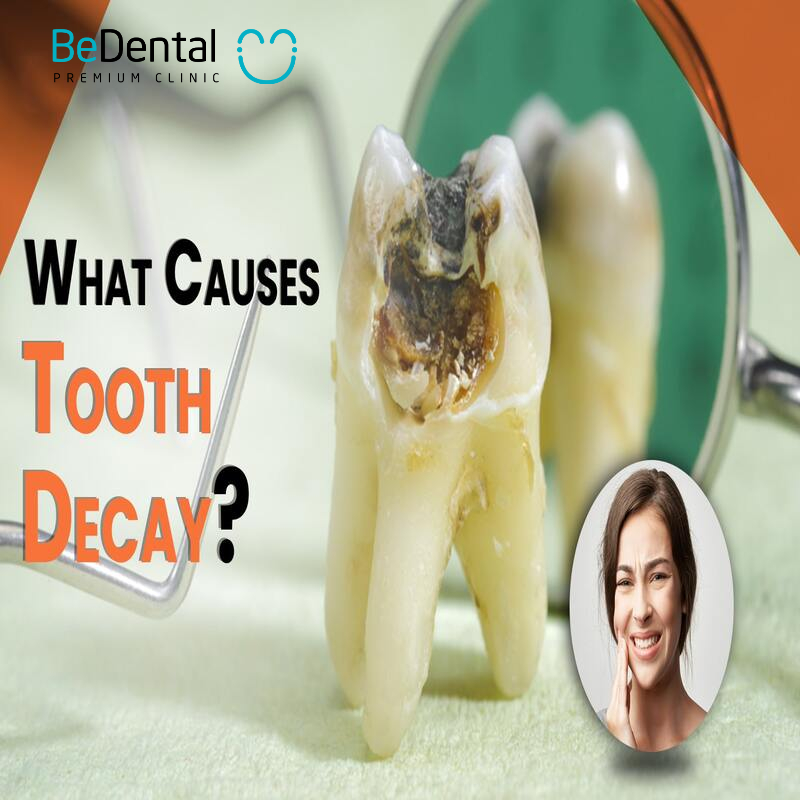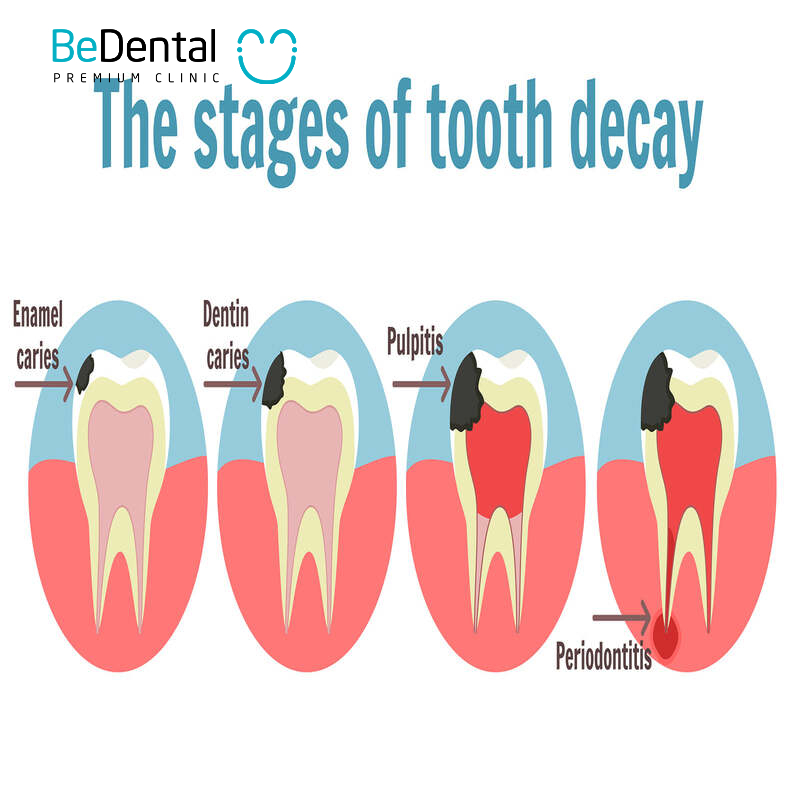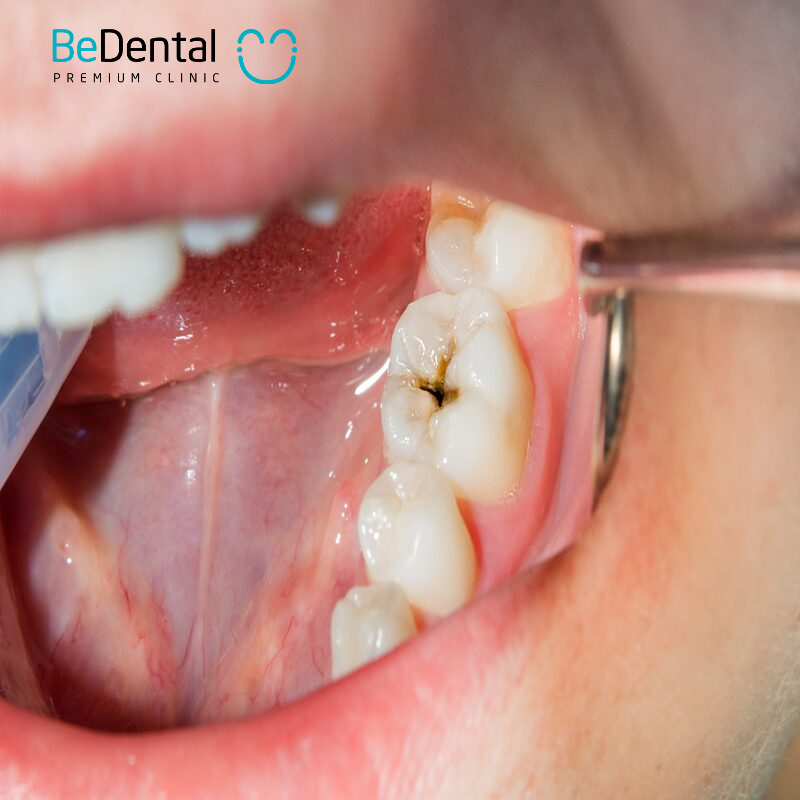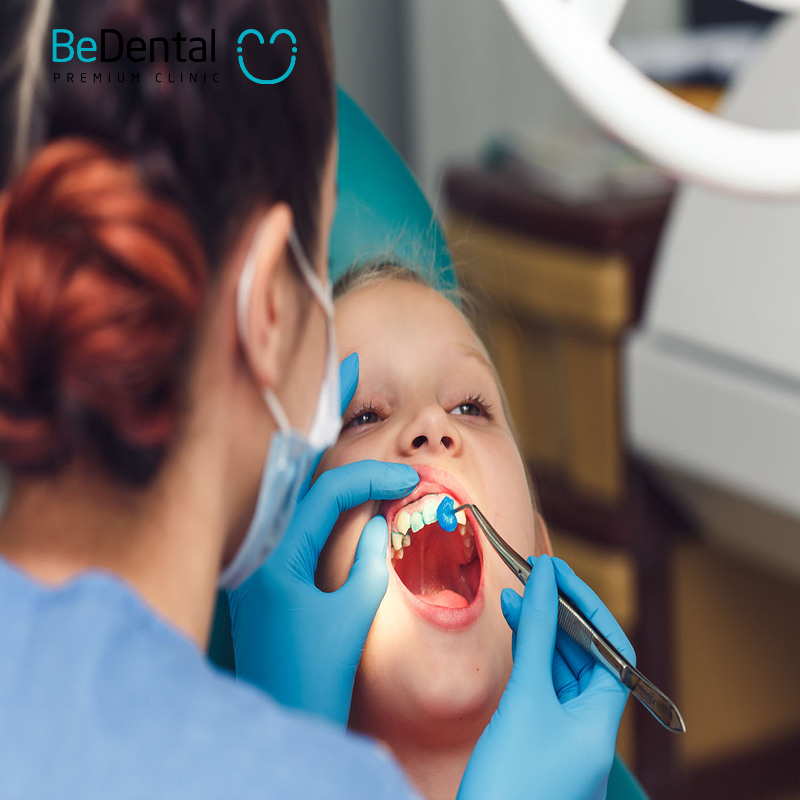Tooth decay is one of the most common oral health issues, affecting about 90% of adults in Vietnam. Statistics show that the rate of tooth decay among children is also significant, with approximately 40% of children aged 6 to 12 years affected. The primary causes of tooth decay are usually a combination of bacteria, dental plaque, poor dietary habits, and inadequate oral hygiene practices. Proper awareness of these causes and implementing appropriate preventive measures can help protect oral health and prevent tooth decay, leading to confident and healthy smiles for everyone.
Current State of Tooth Decay in Vietnam
Tooth decay in Vietnam is a prevalent oral health issue and has become a major concern in the community. According to statistics from the Ministry of Health, around 70% of children aged 6 to 14 have tooth decay, while the rate is also alarmingly high among adults, reaching up to 90% in some areas.
Tooth Decay Situation by Region
Northern Region: The rate of tooth decay among children in the northern region is around 68%. In Hanoi, data shows that up to 75% of elementary school children suffer from tooth decay. Additionally, provinces like Hai Phong and Bac Ninh also report high rates, about 70%.

Central Region: In the central region, the rate of tooth decay among children is approximately 60-65%. Thua Thien Hue has a rate of about 64%, while Da Nang records around 62%.
Southern Region: The southern region has the highest rate of tooth decay among children, reaching up to 72%. In Ho Chi Minh City, data shows that nearly 80% of elementary school children have tooth decay. Dong Nai province also has a similar rate of about 75%.
The main causes of tooth decay include unhealthy eating habits, particularly the consumption of high-sugar and acidic foods, along with a lack of focus on oral hygiene. Many people are still unaware of the importance of proper tooth brushing and regular dental check-ups. Additionally, dry mouth conditions, whether due to dehydration or medication side effects, also contribute to the increased risk of tooth decay.
To improve this situation, experts recommend raising community awareness about oral care, promoting healthy eating habits, and encouraging regular dental visits. Only when people fully understand the significance of oral care can the incidence of tooth decay be significantly reduced.
Causes of Tooth Decay
Various factors contribute to tooth decay, including both subjective and objective causes. Subjective causes of tooth decay encompass issues such as food and beverage choices, nutrient deficiencies, and dry mouth. Objective causes include bacteria and inadequate oral hygiene practices.
Tooth Decay Caused by Bacteria and Dental Plaque:
Bacteria are the primary causes of tooth decay (What is tooth decay?). When food, particularly sugary substances, remains in the mouth, bacteria digest it and produce acid, damaging tooth enamel. Plaque forms when bacteria, food, and saliva combine, creating a sticky film on the surface of the teeth. If not cleaned regularly, plaque can harden into tartar, making it difficult to maintain hygiene and creating conditions favorable for tooth decay.
Tooth Decay Due to Daily Food and Drink Consumption
Sugary and acidic foods are among the most hazardous factors for oral health. When consuming these types of foods, particularly candy, pastries, and soft drinks, acids attack tooth enamel, making teeth more susceptible to decay. Carbonated drinks and sugary beverages also exacerbate the situation due to their sugar content and acidity.
Nutrient Deficiencies- Causes of Tooth Decay
Fluoride and calcium are two essential minerals that help protect teeth from decay. Fluoride strengthens tooth enamel and aids in the remineralization of damaged areas. Nutritional deficiencies, particularly calcium and vitamin D, can lead to weakened teeth that are more prone to decay. A diet lacking in essential nutrients can diminish the teeth’s resistance to bacterial attacks.

Dry Mouth Conditions- Causes of Tooth Decay
Dry mouth can result from various factors, such as medication use, medical conditions, or insufficient hydration. When there isn’t enough saliva in the mouth, its natural cleaning ability diminishes, allowing bacteria to thrive and form plaque, increasing the risk of tooth decay.
Lack of Oral Hygiene Habits- Causes of Tooth Decay
Not brushing teeth properly or skipping brushing altogether is a common cause of tooth decay. Moreover, not using dental floss allows plaque and food particles to remain between teeth, facilitating bacterial growth. Poor oral hygiene habits are a crucial factor that needs improvement to effectively prevent tooth decay.
Signs of tooth decay you may have
Here are some signs that you may have a cavity, with more detailed descriptions:
- Toothache: Persistent pain or discomfort in the tooth is a common indicator of a cavity. This pain may be sharp, throbbing, or constant, and it often worsens when chewing or biting down on food. If the pain occurs spontaneously, even without any apparent trigger, it’s a strong signal that a dental issue may be developing.
- Tooth Sensitivity: Many people with cavities experience heightened sensitivity in their teeth. This can manifest as discomfort or pain when consuming hot, cold, sweet, or acidic foods and beverages. For instance, you might feel a sudden sharp pain when you sip a cold drink or eat ice cream, indicating that the enamel may be compromised.
- Visible Holes or Cavities: As cavities progress, they can lead to the formation of visible holes or pits on the surface of the teeth. These cavities are often accompanied by discoloration, which may appear as dark or black spots on the tooth. If you notice these physical changes, it’s essential to consult a dentist.
- Bad Breath: Chronic bad breath, or halitosis, can be a sign of tooth decay. The presence of bacteria and decaying food particles in the mouth can lead to unpleasant odors. If you maintain good oral hygiene yet still experience persistent bad breath, a cavity may be the underlying cause.
- Gum Disease: Symptoms of gum disease, such as swollen, red gums, can also indicate cavities. If your gums bleed when you brush or floss, or if they feel tender and painful, it’s essential to seek dental advice. Gum disease can occur alongside cavities and should be addressed promptly.
- Dark Spots on Teeth: The appearance of dark or dull spots on your teeth can be a clear indication of decay. These spots may develop as a result of enamel erosion, allowing bacteria to penetrate the tooth structure. Noticing any changes in tooth color can be an early sign of cavities.
- Pain When Biting: If you experience discomfort or pain when biting down on food, it could be a sign of an underlying cavity. This pain may indicate that decay has reached deeper layers of the tooth, affecting the nerves and surrounding tissues. It’s important to consult a dentist if you feel pain while chewing.
If you notice any of these symptoms, it’s important to visit a dentist for a proper diagnosis and treatment.
Effective Ways to Prevent Tooth Decay
Based on the aforementioned causes, here are some key measures to effectively prevent tooth decay.
Practice Proper Oral Hygiene
Maintaining good oral health requires the implementation of proper hygiene practices. Brush your teeth at least twice a day—once in the morning and once at night—for about two minutes each time. Use a soft-bristled toothbrush and fluoride toothpaste to protect your enamel. Don’t forget to use dental floss to clean between your teeth, where a toothbrush cannot reach. Flossing removes plaque and leftover food, preventing tooth decay and gum inflammation. Replace your toothbrush every three months or when the bristles show signs of wear to ensure effective cleaning.

Adopt a Balanced Diet
A proper diet (from WHO- World Health Organization) plays a crucial role in preventing tooth decay. Prioritize nutrient-rich foods like fruits, vegetables, dairy products, and limit the intake of sugary and acidic foods, such as candy and carbonated drinks. Water is vital for maintaining oral health as it helps wash away food debris and stimulates saliva production, which neutralizes acid. Foods rich in minerals like calcium and vitamin D are also essential for developing and maintaining healthy teeth.
| Meal | Food | Benefits |
| Breakfast | – Unsweetened yogurt | Provides probiotics, aids digestion |
| – Whole grain bread with peanut butter | Supplies fiber and protein | |
| – Fresh fruits (banana, apple) | Provides vitamins, minerals, promotes saliva production | |
| Lunch | – Green salad (lettuce, tomato, cucumber) | Provides vitamins and minerals, especially calcium |
| – Grilled chicken or salmon | Offers protein, omega-3, vitamin D | |
| – Brown rice or sweet potatoes | Source of complex carbohydrates | |
| Snack | – Cashews or almonds | Contains calcium, magnesium, beneficial for bone and dental health |
| – Unsweetened green tea | Anti-inflammatory, antioxidant properties | |
| Dinner | – Stir-fried vegetables (broccoli, carrots) | Provides vitamins, minerals, helps remove plaque |
| – Lean beef or tofu | Source of protein, provides iron and vitamin B12 | |
| – Whole grains (quinoa or bulgur) | Supplies fiber and minerals | |
| Water | – Clean water | Maintains moisture in the mouth, helps wash away food particles |
| – Mineral water | Provides minerals (calcium, magnesium) |
Regular Dental Check-ups
Regular dental visits are an essential part of oral health care. Frequent check-ups help detect issues such as tooth decay, gum disease, and other oral health problems early. Dentists will also perform cleanings to remove plaque and tartar, maintaining oral health. Check-ups should occur at least twice a year, but if you have oral health concerns or a high risk of disease, consult your dentist about more frequent visits.
Use Supportive Products:
Utilizing supportive products such as fluoride toothpaste and antibacterial mouthwash can enhance protection for your teeth. Antibacterial mouthwash helps kill harmful bacteria, cleans the mouth, and reduces the risk of tooth decay. Additionally, consider using supplements like calcium and vitamin D to support oral health. These products not only help maintain tooth enamel but also contribute to the development and recovery of teeth.

BeDental is a reputable dental clinic in Vietnam
BeDental is a reputable dental clinic in Vietnam that offers comprehensive examination and treatment for cavities for patients of all ages. The clinic’s commitment to providing high-quality dental care is evident through its team of experienced professionals, advanced technology, and patient-centered approach.
One of the primary reasons BeDental is trusted by many families is its focus on preventive care, ensuring that dental issues are addressed before they become severe. The clinic emphasizes education, helping patients understand the importance of oral hygiene and regular check-ups. With a wide range of services, including fillings, root canals, and restorative treatments, BeDental ensures that each patient’s unique needs are met, providing effective solutions for managing cavities and promoting overall dental health.
For those seeking further consultation regarding dental examination services, please visit BeDental’s locations in Hanoi or Ho Chi Minh City. You can also reach us at our hotline: (+84) 934.61.9090 / (+84) 899.555.636 or through our Facebook page, BeDental, for prompt and accurate assistance.




